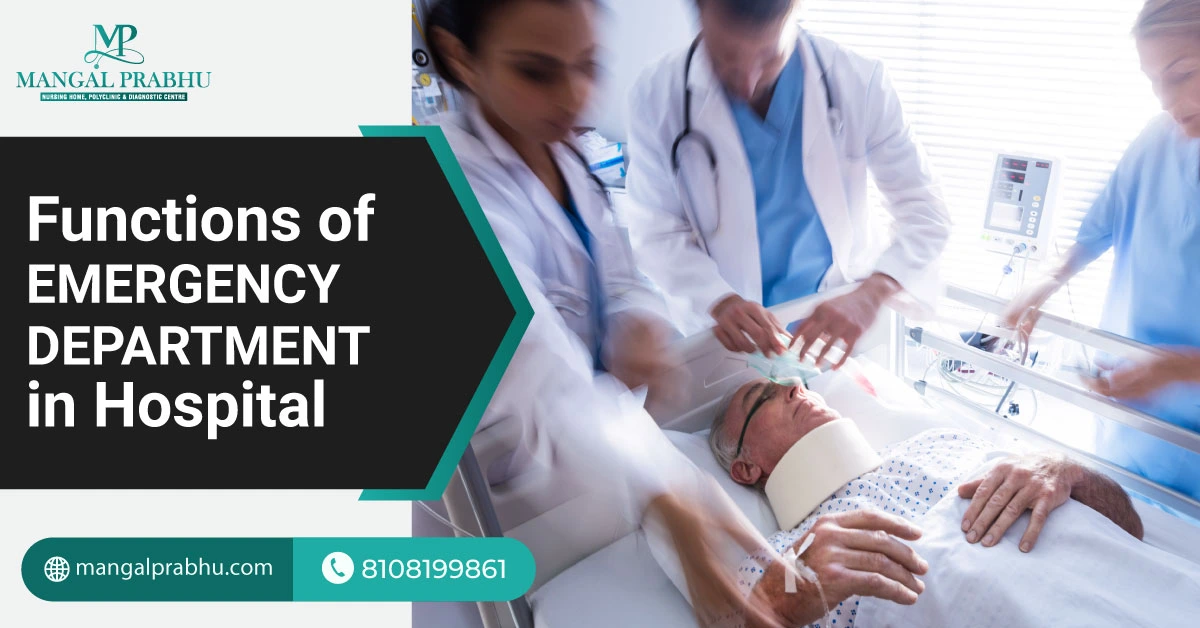
Functions of Emergency Department in Hospital
Critical medical conditions that require immediate medical attention can strike at any time. Anyone can become the victim of unexpected illnesses or accidents that can be life-threatening if not treated promptly. That’s when the multispecialty hospital in Navi Mumbai, equipped with an emergency department, comes to your rescue.
The department doesn’t just have advanced medical devices that monitor the patient’s vitals round-the-clock, but these are staffed 24/7 by professionals who offer premium care to the patient. So, what exactly are the functions of the emergency department in the hospital? Let’s find out.
Functions of Emergency Department in Hospital
Primary Functions
When a patient is admitted to the emergency room, it’s mainly because of a life-threatening condition that can result in severe complications or possibly death in most cases. This includes patients who’ve suffered a heart attack, a severe injury to their vital organs, or breathing difficulties. After admission, the doctors will carefully assess the root cause of the issue and focus on stabilizing your health, ensuring that your vitals are controlled, you are not in pain, and you won’t suffer further deterioration.
A Triage
An emergency care hospital in Navi Mumbai follows a triage system in which patients are sorted by the severity of their condition. Those who have a critical medical issue get immediate attention. Patients who can survive without advanced life support are admitted to the general ward or private rooms (based on their preference). The system ensures that patients with severe medical issues, such as cardiac arrest or trauma, are given emergency care to save their lives.
Coordination with Specialized Departments
A multispecialty hospital is staffed with doctors specializing in different segments of the healthcare industry. These hospitals have neurosurgeons, cardiologists, pediatricians, gynecologists, and other specialists who can offer immediate care and surgery if needed. Depending on the case, the patients might be referred to another hospital that’s staffed with specialists in the particular area of medicine.
Challenges Faced
1) Stressful Decisions:
Specialists working in the emergency department often have to make critical decisions, such as whether it’s worth keeping the patient on life support or not. Besides, the life-threatening illnesses that sometimes lead to death can be super overwhelming for doctors.
2) Switching Jobs:
Healthcare professionals must be qualified to perform various invasive and non-invasive treatments for different cases. One minute, they may be handling an emergency gynecology surgery to repair a ruptured fallopian tube, and the next, they may be performing an emergency kidney transplant. This can make their jobs challenging.
3) Technological Challenges:
Not every emergency department in a multispecialty hospital is equipped with advanced technological tools to handle emergency cases effectively. Besides, overcrowding may result in a shortage of hospital beds and rooms to admit critically ill patients.
Conclusion
There’s no denying that emergency units make hospitals the “safe place” for people who’ve sustained an unexpected injury or medical crisis. The key players are qualified doctors who do their best to keep the patient alive, stabilize their vitals, and ensure that their condition is normal. Besides that, high-quality, technologically advanced tools used in these facilities offer the best life support.
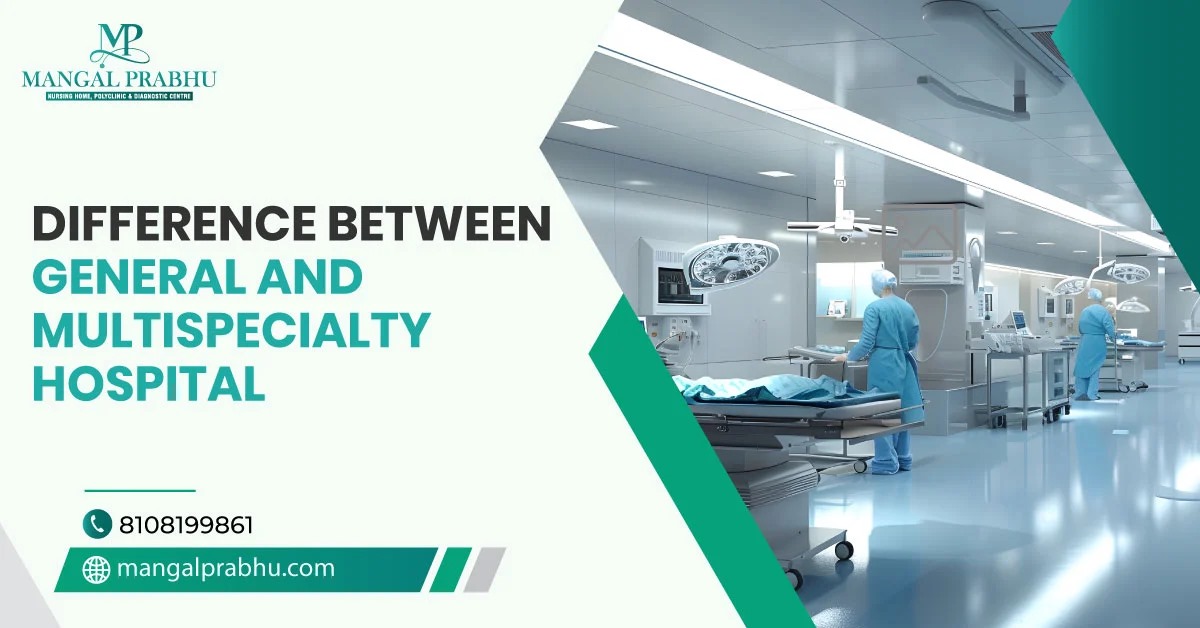
Difference Between General and Multispecialty Hospitals
Choosing the best hospital can be overwhelming. With so many options, it’s often hard to determine which hospital is most suitable for you. Hospitals in India are categorized into two main types: general and multispecialty.
As the name suggests, multispecialty hospitals in Navi Mumbai offer all kinds of medical services under one roof. This may include different departments for cardiovascular, neuro, cancer, and other patients. On the other hand, general hospitals offer basic healthcare services, which may cover surgical treatments, outpatient procedures, diagnostic services, and so on.
Let’s understand the difference between general and multispecialty hospitals.
General Hospitals
General hospitals offer primary healthcare services without specializing in any specific medical field. The hospitals have general practitioners who can address common infections, less severe illnesses, and minor surgical procedures. Simply put, a general hospital is where you should go if you have common illnesses and small injuries that may not require specialized care.
Multispecialty Hospitals
Multispecialty hospitals offer advanced treatment for a particular disease. As mentioned earlier, these hospitals have multiple departments that address issues related to different medical conditions, like urology, neurology, cancer, cardiovascular illnesses, and the list goes on. They have medical practitioners specializing in chronic illnesses. From an accurate diagnosis to proper treatment, these hospitals can seamlessly cater to all medical issues.
Key Differences Between General and Multispecialty Hospitals
Let’s take a look at the common differences between these hospitals.
| Basis | General Hospital | Multispecialty Hospital |
| Medical Expertise | You can find general practitioners who offer primary care for common illnesses, like flu, infection, or injuries. | They have specialists qualified and trained to address serious cases. |
| Equipment | Offer basic medical facilities and diagnostic services, like bloodwork and X-rays. | Equipped with advanced imaging tests, such as MRI and CT scans. They also have ICUs and advanced facilities for post-operative care. |
| Patient Care | Cater to common health issues. | Patients with severe and chronic medical issues are referred to the multispecialty hospitals. |
| Size | General hospitals are in small towns and rural areas. They are small and have fewer departments. | These hospitals have multiple departments, each with practitioners specializing in different medical fields. |
Advantages of General Hospitals
- Wider Accessibility: General hospitals are available in local areas, including small cities, making services accessible to patients who can’t travel long distances.
- Reasonable Prices: General hospitals are your best option if you are looking for affordable hospitals in Navi Mumbai.
- Emergency Care: Most general hospitals have the tools and equipment to handle emergency cases before referring them to multispecialty hospitals.
Cons
- Lack of advanced facilities and infrastructure
- Do not have specialists for chronic health conditions.
Advantages of Multispecialty Hospitals
- One-stop solution: Offer comprehensive medical assistance in one place
- Specialists: These hospitals are staffed with specialists, including physicians, surgeons, and consultants.
- Advanced Diagnostics: Multispecialty hospitals have advanced diagnostic tools to diagnose different health conditions accurately.
- Large Infrastructure: These hospitals have ventilators, dialysis machines, operation rooms, and other advanced facilities to handle emergency cases and offer post-operative care to the patient.
Cons
- These are expensive
- Inaccessible to people from small towns
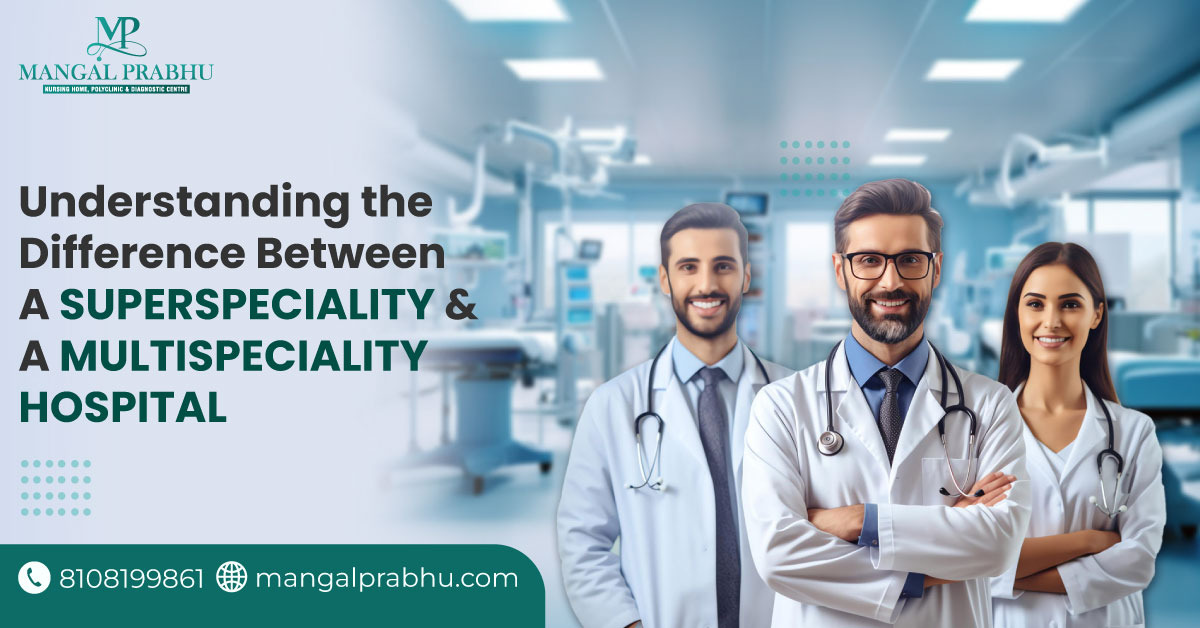
Difference Between a Superspeciality and a Multispeciality Hospital
Choosing a reliable hospital is often a challenging decision for patients. The two most popular choices are super specialty and multispecialty hospitals. Both offer exceptional treatment facilities, but the difference lies in the range of treatment options available.
Super specialty, for example, is known for treating patients suffering from a specific illness. Multi-specialty hospitals are general hospitals that treat a wide array of illnesses. In this post, we’ll take a look at the differences between multispecialty hospitals in Navi Mumbai and their super specialty counterparts. Let’s get started.
Overview of Superspeciality and Multispeciality Hospital
Super specialty hospitals, as mentioned above, are hospitals specializing in treating a specific kind of illness. These hospitals do not have as many departments as a general hospital, but they are known for professional healthcare experts who have extensive knowledge and experience in treating a specific medical condition. Examples of super specialty hospitals include orthopedic hospitals and cancer hospitals.
Multispecialty hospitals, on the other hand, are general hospitals that involve healthcare providers specializing in different branches of medicine and treating a vast array of illnesses. These hospitals are larger than their super specialty counterparts and have several departments dedicated to different treatment options. For instance, a multi-specialty hospital has a department for oncology, orthopedics, neurology, reproductive, urology, and more.
Also Read: 5 Factors To Consider While Choosing A Right Multispecialty Hospital
Differences Between Superspeciality and Multispeciality Hospital
1) Scope:
Super specialty hospitals are confined to a certain branch of medicine. For example, a cardiac hospital focuses on cardiology patients mainly and has general doctors, surgeons, and other experts from the cardiology department. Multispecialty hospitals provide comprehensive medical care, which covers different illnesses.
2) Patients:
Superspecialty hospitals attract patients diagnosed with a healthcare problem that these hospitals specialize in. Multispecialty hospitals are for all patients, irrespective of their medical condition or the type of treatment they require.
3) Specialization and Facility:
Superspecialty hospitals offer advanced medical care and are equipped with equipment and infrastructure that’s tailored to their specialty. Multi-specialty hospitals cover a diverse range of equipment and staff that’s a mix of general doctors and specialists.
4) Cost:
Superspecialty hospitals are comparatively more expensive than multispecialty because of the specialized care and high-end facilities offered. If you are looking for an affordable hospital in Navi Mumbai, a multispecialty hospital is your best bet.
Which Among Super Specialty and Multispecialty Hospitals is a Good Option?
Both offer an infrastructure that’s tailored to the range of treatments and the branch of medicine the hospital focuses on. A super specialty hospital is recommended for patients diagnosed with a chronic illness or a serious medical condition that requires specialized care from the industry’s top and most experienced healthcare professionals.
Multi-specialty is for the general public experiencing mild issues. These hospitals have different departments for different illnesses and experienced healthcare professionals for each department. However, the level of care you get from a super specialty hospital is much better and advanced, as they have professionals specializing in the specific area of medicine.
That was all about super specialty and multispecialty hospitals. Choose a facility that suits your individual needs and budget.
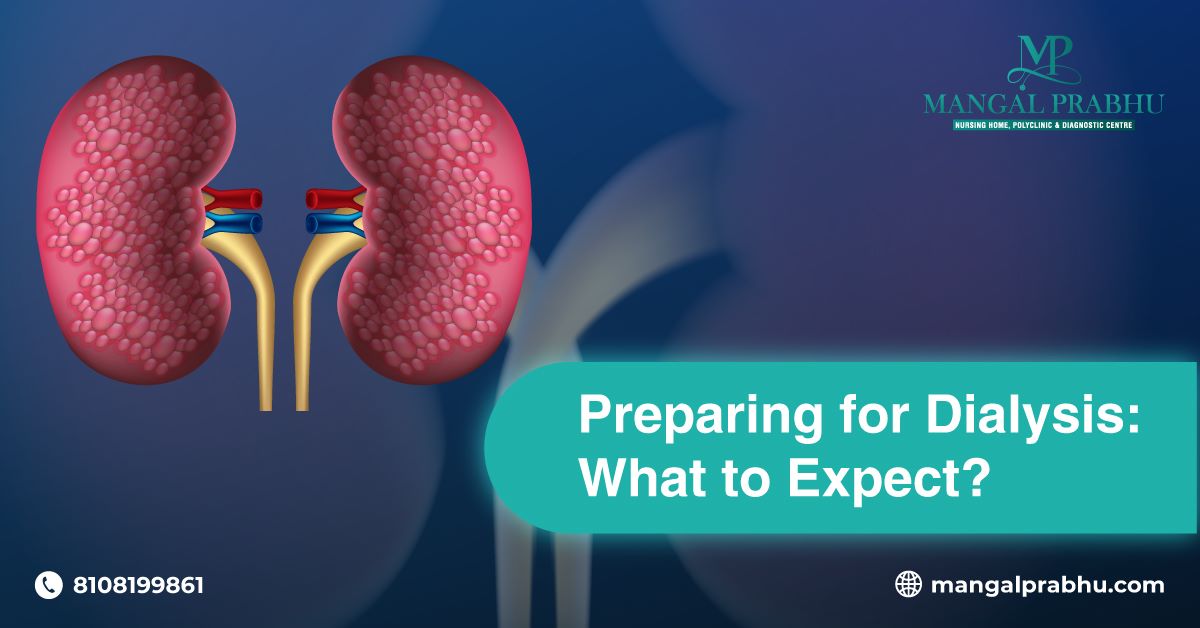
Preparing for Dialysis: What to Expect?
Your kidneys can fail due to many reasons. Chronic Kidney Failure, diabetes, lupus, and other issues can affect your kidney function, resulting in the buildup of toxins in your bloodstream. A nephrologist in Navi Mumbai recommends dialysis when your kidney function drops to a certain level, usually 15 percent. Let’s discover more about dialysis benefits, side effects, and preparation tips.
Types of Dialysis
Dialysis is performed in two ways:
- Hemodialysis: The blood is transferred for filtering through a dialyzer to an external machine. The purified blood is then returned to your body. It is a 3-4 hour session, performed thrice a week.
- Peritoneal Dialysis: In Peritoneal dialysis, a catheter is placed in your abdomen and is connected to the bag containing the dialysis solution. You can drain the liquid into another empty bag once it has collected the waste from your bloodstream. The procedure must be repeated 3-4 times a day.
How to Prepare for Dialysis
The preparation for dialysis is different for both types of procedures. For hemodialysis, the Arteriovenous fistula (AV) is created in your arm by joining an artery with the vein to create a broader blood vessel.
If you have too narrow blood vessels for this procedure, the surgeon might connect the two using a hollow tube, called a graft. By expanding the size of the blood vessels, AV ensures smoother blood flow in and out of your system. If it’s an emergency, the surgeon might insert a tube through your neck to get quick access to the blood vessels.
Also Read: What Is The Importance Of Dialysis? Which Patients Require It The Most?
For both procedures, there are certain restrictions regarding your food and fluid intake. Your healthcare provider will advise you to limit the fluid, as the dialysis procedure can’t remove the waste that’s accumulated in 3-4 days from your blood.
You also need to watch your diet. Excess intake of sodium, potassium, and phosphorus can increase the level of these minerals in your bloodstream quickly. It’s best to work with a dietician to have the best diet plan for your treatment.
Benefits of Dialysis
The biggest advantage of dialysis is that it removes waste and extra fluid within your body to prevent them from building up and damaging your organs. It also maintains the levels of sodium and potassium in your body. Moreover, dialysis regulates your blood pressure and prevents kidney diseases.
Possible Risks of Dialysis
Inserting a catheter in your abdomen carries significant risks. For example, bacteria and contaminants can enter your stomach through this catheter, resulting in vomiting, nausea, and fever. Likewise, hemodialysis carries the risk of infection around the site of the incision. Here are some side-effects of dialysis:
- Muscle cramps
- Low blood pressure
- Weakness from sudden blood fluctuation
- Blood loss
- Hernia
A kidney transplant is a good alternative for those who can’t schedule regular visits to the dialysis center in Navi Mumbai.
Conclusion
Every person’s body reacts differently to dialysis. Your risk of developing side effects also depends on your health condition and the type of dialysis you are considering. Discuss your risk factor with the healthcare provider to ensure smooth dialysis sessions.

When to Consult a Doctor During Pregnancy?
The two colored lines on the pregnancy test can induce a lot of emotions in the mother-to-be. You might experience fear, excitement, and a whole lot of emotions. No matter whether the pregnancy was a surprise or planned, or if it’s your first or fourth child, having a healthy pregnancy is the ultimate goal of every parent. That’s what the pregnancy care hospital in Navi Mumbai helps you achieve. But when should you see a doctor? Well, the sooner the better.
Plus Sign on the Pregnancy Test
Each pregnancy is different and the level of care each woman needs during this phase is also different. Before you consult a doctor, take a pregnancy test at home. The ideal time to do that is when you have missed a period. Women who have PCOS or menstrual problems that result in missed periods should watch out for other signs of pregnancy, such as nausea and vomiting, backache, frequent urination, tender and painful breasts, food cravings, changes in smell and taste, etc.
An ideal time to detect a pregnancy is around the 8th week. The first week of your pregnancy is your last period. So, the first day of your last period is the starting date of your pregnancy and by the time you have missed your period, you are already four weeks pregnant. That’s because it’s not possible to identify when you conceived before your missed period.
Also Read: 10 Most Common Pregnancy Symptoms And How To Manage Them
Why Visit the Doctor Soon?
Obstetricians & gynecologists in Navi Mumbai advise pregnant women to see a doctor as soon as their home pregnancy test is positive. The gynecologist will check your due date to figure out how far along you are. They will see if there is any age or family-related risk factor or any possibility of complications that could pose pregnancy risk. They will recommend prenatal supplements, as well as different tests that confirm your pregnancy.
During pregnancy, the thick formation of the mucus plug is observed in your uterus. It closes your womb and prevents any bacteria or germs from entering the womb and harming your baby. It stays there until you near the delivery date. By six weeks, the doctor can hear your baby’s heartbeat.
Is It Too Late?
It’s better to see a doctor as soon as you take the pregnancy test. But it’s common for women to detect a pregnancy when they are 7-8 weeks pregnant. If you have diabetes, high blood pressure, or any medical condition that can make your pregnancy risky, it’s advisable to see a doctor earlier. Those with ectopic pregnancy, a history of miscarriage, and other pregnancy-related issues should keep in touch with a gynecologist. Some may also witness bleeding, which can indicate a complication.
You can switch doctors, but it’s best to have the same professional and team throughout your pregnancy. On your first visit, the doctor will confirm your pregnancy, check your family history, and ask about previous pregnancy-related complications. Take all your medical reports with you and share your medical history with the doctor.
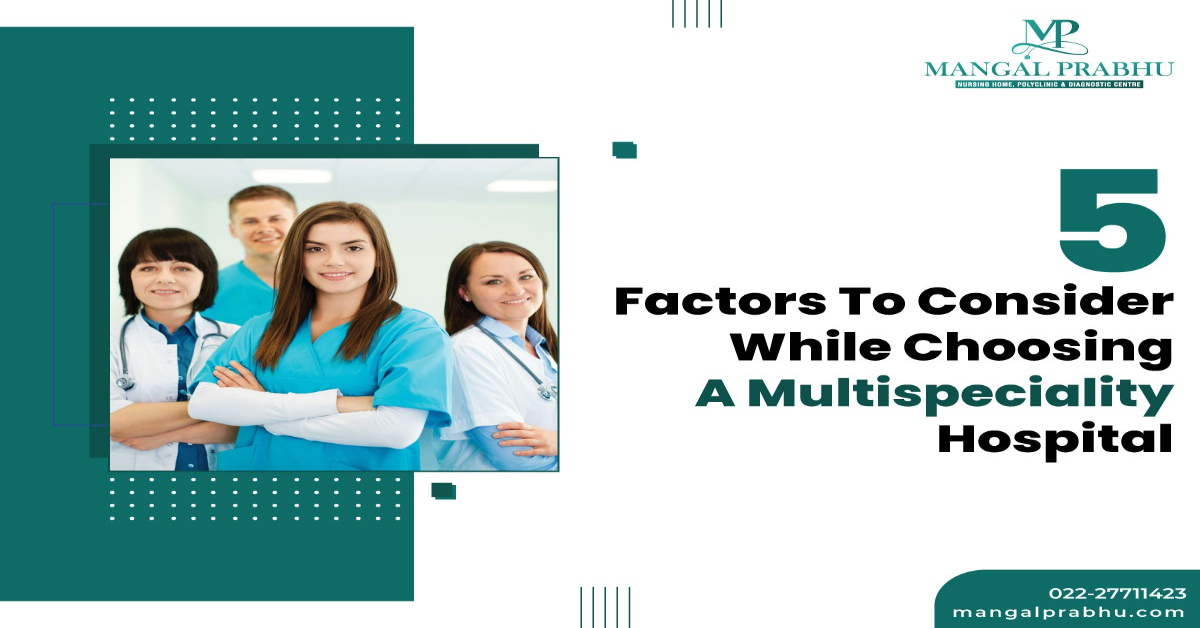
5 Factors To Consider While Choosing A Right Multispecialty Hospital
A medical center designated as a multi-specialty facility provides a wide range of healthcare services and treatments in different medical specializations. Specialists and healthcare workers from a variety of specialties, including but not limited to cardiology, neurology, gastroenterology, orthopaedics, urology, oncology, and obstetrics/gynaecology, usually work together in these facilities.
Multispecialty hospitals provide patients with access to a wide range of medical treatments under one roof as part of their holistic approach to healthcare. These hospitals often offer a variety of healthcare alternatives along with cutting-edge clinical equipment and technology.
They might also offer emergency care, outpatient, inpatient, and rehabilitation treatments. Everyone would like to receive the finest treatment possible when it comes to our health, the well-being of our family members, or both. So, it is always vital to do due research and gather information on a hospital or healthcare facility.
Selecting a multispecialty hospital can be difficult, but there are some crucial considerations that can help in choosing the right decision, according to one multispecialty hospital in Navi Mumbai, selecting a multispecialty hospital might be difficult, the following are some key factors that can help in choosing the right choice:
Also Read: Essential Health Screening After 40
Factors That Can Help In Choosing The Right Multispecialty Hospital:
1. Credibility and Certification:
Choose a hospital that is certified by respected organizations and has a solid reputation. The hospital’s compliance with specified standards for safety and quality is ensured by accreditation. By reading internet reviews, requesting referrals from friends and family, or speaking with your primary care physician, you can learn more about the reputation of the hospital.
2. Knowledge and Specialties:
Take into account the medical staff’s knowledge and areas of specialization. Search for a hospital that has a staff of licensed and skilled medical practitioners in the specific specialties that you or your loved one may need. Individuals will be given the greatest care and treatment available as a result of this.
3. Resources and Tools:
Make sure the hospital has cutting-edge amenities and machinery to deliver cutting-edge medical care and treatments. It is crucial to look for cutting-edge surgical techniques, modern diagnostic equipment, and other specialized healthcare centers, suggest doctors in the Best Hospitals in Navi Mumbai.
4. Location and Accessibility:
Choose a hospital that is easily accessible to you and your family, as well as conveniently placed. Take into account the distance to your house or place of employment, the trip time, and the available transportation. Be sure the hospital has plenty of parking and is accessible to wheelchair users.
5. Insurance and Cost:
Verify that the hospital is covered by your insurance and that the cost of your care is within your means. Inquire about the hospital’s billing and payment procedures, as well as any additional charges or concealed expenses. For patients who can’t afford the full healthcare bill, some hospitals may offer financial assistance or payment plans.
Summary:
A multispecialty hospital should be chosen after carefully weighing a number of essential factors, including the hospital’s repute, the credentials, and specialties of its medical professionals, the infrastructure and amenities, its accessibility and location, and its insurance and financial situation.
It’s critical to pick a hospital with a solid reputation, knowledgeable medical personnel, cutting-edge facilities, an ideal location, and an inexpensive price. You may choose the best multispecialty hospital for you or your loved ones by taking these factors into account, guaranteeing that you get the greatest possible medical attention and care.
